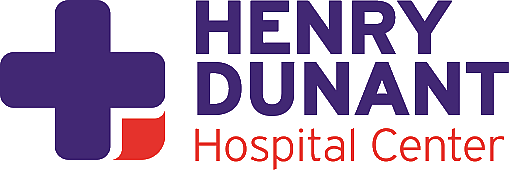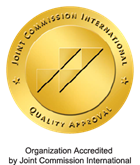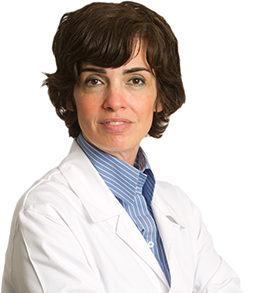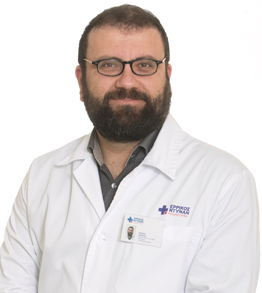
Center for Geriatric Assessment
The population of the European Union is ageing: in 2020, 21% of the population was aged 65 and over, compared to 16% in 2001, showing an increase of 5 percentage points. Looking more specifically at the group aged 80 and over, their share almost doubled over that period from 3.4% in 2001 to almost 6% in 2020. According to the Hellenic Statistical Authority (ELSTAT), the share of people aged 65 and over in the total population of Italy, Greece, Finland, Portugal, Germany and Bulgaria is 22%, the highest in the EU. The population explosion of older people is a challenge for health and welfare systems.
Henry Dunant Hospital Center, recognizing the increased needs and particularities of the effective care for the elderly, established a Center for Geriatric Assessment. This is a model Center, which offers people over 75 years of age the possibility of assessing and treating a wide range of disorders that affect them, such as chronic diseases and geriatric syndromes.
The Center’s team, consisting of specialized health professionals (geriatrician, nurse, nutritionist, physiotherapist, social worker, and psychologist) is in direct collaboration with all medical specialties as well as other health professionals, ensuring a multifaceted and multidisciplinary approach to the issues that arise, offering the best available solutions and interventions.
The Geriatric Evaluation Center collaborates with:
- the Medical School of the National and Kapodistrian University of Athens, participating in the postgraduate program “Physiology of aging and geriatric syndromes” under Prof. Mr. Sfikakis
- the Dental School of Athens, participating in the educational courses of the specialization of Prosthodontics, specifically in the course of Gerodontology under Professor A. Kossioni
- MISSION ANTHROPOS, participating in joint actions for geriatric assessment in elderly care units in cooperation with institutions such as TIMA and NIARCHOS FOUNDATION.
It carries out observational and randomized studies and collaborates scientifically with other geriatric centers abroad. The scientific director of the Center A. Koutsouri was recently elected member of the European Academic board of the European Geriatrics Society 2024-2025.
Telephone: (+30)210-6979185
Call Center: (+30)210-6972000
Email: geriatric@dunant.gr
Director: Koutsouri Anastasia
Activities
Geriatric assessment is the basic tool of Geriatrics. Its purpose is to assess the condition of elderly people, including their physical, functional, cognitive and mental state, while respecting the preferences and wishes of the patients in consultation with their family environment in order to maintain their functionality and autonomy and prevent their decline. The geriatric assessment lasts one hour (or more) and includes, in addition to the objective examination, the assessment through specialized tests of the patient’s functional status, nutrition, the existence of depression, mental status, sensory disorders, and social history.
Thus, the Geriatric Assessment Center, through a series of tests (cognitive, motor, nutritional, etc.), offers the possibility of:
- a comprehensive assessment of older people
- identifying the areas where early dysfunctions are detected in the elderly, in order to provide early intervention to extend their autonomy
- a focused assessment of specific situations that concern the elderly and/or their families or that constitute a cause for concern for the treating physician, such as recurrent falls, unscheduled hospitalization, sudden changes in their general condition and functioning.
What are geriatric syndromes?
Special care is given to the assessment and treatment of the so-called geriatric syndromes. Geriatric syndromes are not organic diseases, but conditions that occur during ageing and lead to a decline in the patients’ condition.
the most common ones are:
- frailty
- malnutrition
- sarcopenia
- falls
- incontinence
- cognitive impairment
- delirium
- sensory disorders
- pressure ulcers
- polypharmacy
GERIATRIC CASE
Ms. M. is 82 years old, a widow, lives in upper Kypseli, while one of her children lives abroad and the other one works in the province and visits her every other weekend.
She has had rheumatoid arthritis for 30 years with mobility difficulties that affect her in her daily activities. She also suffers from type II diabetes mellitus, arterial hypertension, hyperlipidemia, osteoporosis, macular degeneration and has poor eyesight and urinary incontinence. Eight months ago, she underwent surgery for a hip fracture due to a fall and has since lost twelve pounds of weight. She carries ten-year-old complete dentures with which she cannot chew food well and complains of persistent dry mouth.
She takes eleven different medications broken down into 23 doses per day, according to the treatment guidelines of the companies for the diseases from which she suffers. She frequently takes analgesics because of the severe pain she has.
Since the fall, Ms. M relies on others to help her move around and get to her blood test appointments, to her special medical appointments every six months and to get her six-monthly prescriptions. She takes a taxi three times every six months for her visits to the rheumatologist, cardiologist, and diabetologist, and pays for a monthly home visit to a podiatrist due to diabetes mellitus and inability to properly control her lower extremities. At the same time, because she has completed the prescribed physiotherapies, she pays a physiotherapist twice a week for strengthening and balance exercises. She can’t go to her dentist because the entrance to the dental office has eight steps, which she cannot climb after the fracture.
During the last visit for blood testing the patient was ‘tired’’ from all the tests, medications, doctor’s appointments, pains, and from not being able to chew and enjoy food. She just wanted to relax a little and be able to do what she liked without the constant restrictions and goals.



